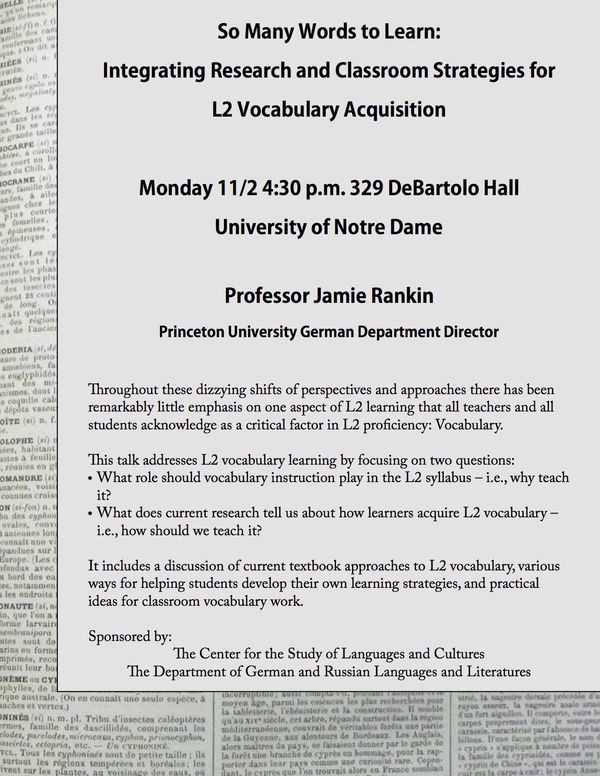Professor Jamie Rankin, Director of the Princeton University German Department, will deliver a lecture on L2 vocabulary acquisition on Monday 11/2 at 4:30 p.m. in the CSLC. Don't miss his talk sponsored by the CSLC and the German and Russian Languages and Literatures Department. Abstract and bio follow:
So many words to learn: Integrating research and classroom strategies for L2 vocabulary acquisition
Second language (L2) classrooms have undergone radical changes during the past 50 years. At various points they have focused on formal linguistic structures, then on drills and “habit formation,” on input and “affective filters” as opposed to a “focus on form,” on cultural input, sociocultural perspectives and social networking.
Throughout these dizzying shifts of perspectives and approaches, there has been remarkably little emphasis on one aspect of L2 learning that all teachers and students acknowledge as a critical factor in L2 proficiency: Vocabulary.
As one writer has noted: “If you don’t know any grammar, you can’t say very much; if you don’t know any vocabulary, you can’t say anything.” And this applies to more than getting around: A knowledge of vocabulary is as critical to interpreting texts as it is to interaction and presentation – that is to say, it lies at the heart of all three categories of L2 proficiency as currently conceptualized.
This talk addresses L2 vocabulary learning by focusing on two questions:
-
What role should vocabulary instruction play in the L2 syllabus – i.e., why teach it?
-
What does current research tell us about how learners acquire L2 vocabulary – i.e., how should we teach it?
It includes a discussion of current textbook approaches to L2 vocabulary, various ways for helping students develop their own learning strategies, and practical ideas for classroom vocabulary work.
***
Jamie Rankin directs the language program in the German Department of Princeton University. He has published articles in Unterrichtspraxis and the Modern Language Journal, focusing on the dynamics of corrective feedback in the classroom; training and mentoring graduate student TA’s; and assessing the usefulness of classroom materials for beginning and intermediate language learners. He is the co-author of Handbuch zur deutschen Grammatik (Cengage, now in its 6th edition) and is currently developing a first-year curriculum for Beginning German that integrates culture, grammar and high-frequency vocabulary for an online platform. In 2014 he was appointed as inaugural director of the new Princeton Center for Language Study.
